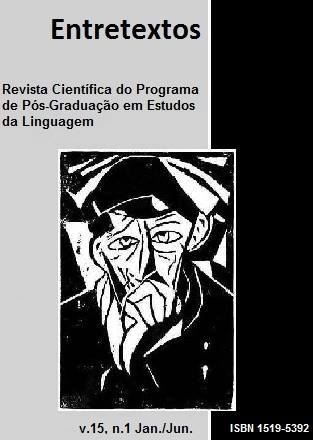The multifunctionality of de repente: persistence and grammaticalization
DOI:
https://doi.org/10.5433/1519-5392.2015v15n1p157Keywords:
De repente, Changing, GrammaticalizationAbstract
In this article we explain the trajectory of grammaticalization of de repente in Brazilian Portuguese, from the sixteenth to the twentieth century, according to the functionalist perspective, as proposed Diewald, 2002; Brinton and Traugott, 2006; Bybee, 2010; Traugott, 2011, among others. We intend to show that: (i) in all studied synchronicities de repente maintains its function, (ii) the employment of de repente as operator epistemic detected in data for the twentieth century, indicates a process of grammaticalization, driven by subjectification, (iii) there is evidence that the change goes toward the intersubjetification, with respect to its most recent use as a discourse marker. The analysis is based on data collected in the use of language, written and oral forms. Collect data written site Corpus of portuguese and oral language samples from the collection of Peul (Program of Studies on the Use of Language), called Amostra Censo.
Downloads
References
BYBEE, Joan; PERKINS, Revere; PAGLIUCA, William. Phonology and Language Use. Cambridge: Cambridge University Press, 2001.
BYBEE, Joan; PERKINS, Revere; PAGLIUCA, William. Sequentiality as the basis of constituent structure. In: GIVÓN, Talmy; MALLE, Bertram F. (ed.). The Evolution of Language out of Prelanguage. Amsterdam: Benjamins, 2002, 109-34.
BYBEE, Joan. Language, Usage and Cognition. Cambridge: Cambridge University Press, 2010.
BRINTON, Laurel and TRAUGOTT, Elizabeth C. Lexicalization and Language Change. Cambridge: CUP, 2006.
DIEWALD, Gabriele. A model for relevant types of contexts in grammaticalization. In: WISCHER, I.; DIEWALD, G. (eds.), New Reflections on Grammaticalization, 2002, p. 103-120.
ECKARDT, Regine. Grammaticalization and semantic change. In: NARROG, H.; HEINE, B. (ed.). The Oxford handbook of grammaticalization. Oxford: Oxford University Press, 2011.
GONÇALVES, Sebastião Carlos L. et alii. Introdução à gramaticalização: princípios teóricos & aplicação. São Paulo: Parábola Editorial, 2007.
HARRIS, Alice C.; CAMPBELL, Lyle. Historical Syntax in Cross-linguistic Perspective. Cambridge: Cambridge University Press, 1995.
HASPELMATH, Martin. Does grammaticalization need reanalysis? Studies in Language, v. 22, p.315-351, 1998.
HEINE, Bernd. On the role of context in grammaticalization. In: WISCHER, I.; DIEWALD, G. (ed.). New Reflections on Grammaticalization. 2002. xiv, 437. p. 83-101.
HEINE, Bernd et al. Grammaticalization: a conceptual Framework. Chicago: University of Chicago Press, 1991.
HIMMELMANN, Nikolaus. P. Lexicalization and grammaticization: oposite or orthogonal? In: BISANG, Walter; HIMMELMANN, Nikolaus P.; WIEMER, Björn (ed.). What Makes Grammaticalization? a look from its fringes and its components. Berlin: Mouton de Gruyter, 2004. p.21-42.
HOPER, Paul; TRAUGOTT, Elizabeth. Grammaticalization. Cambridge: Cambridge University Press, 1993.
NICOLLE, Steve. Pragmatic aspects of grammaticalization. In: NARROG, H.; HEINE, B. (eds). The Oxford handbook of grammaticalization. Oxford: Oxford University Press, 2011.
TRAUGOTT, Elizabeth C. Grammaticalization and mechanisms of change. In: NARROG, H. and HEINE, B. (ed.). The Oxford handbook of grammaticalization. Oxford: Oxford University Press, 2011.
Downloads
Published
How to Cite
Issue
Section
License
Copyright (c) 2015 Entretextos

This work is licensed under a Creative Commons Attribution 4.0 International License.
Entretextos adota a Licença Creative Commons Attribution 4.0 International, portanto, os direitos autorais relativos aos artigos publicados são do/s autor/es.
Sob essa licença é possível: Compartilhar - copiar e redistribuir o material em qualquer suporte ou formato. Adaptar - remixar, transformar, e criar a partir do material, atribuindo o devido crédito e prover um link para a licença e indicar se mudanças foram feitas.























